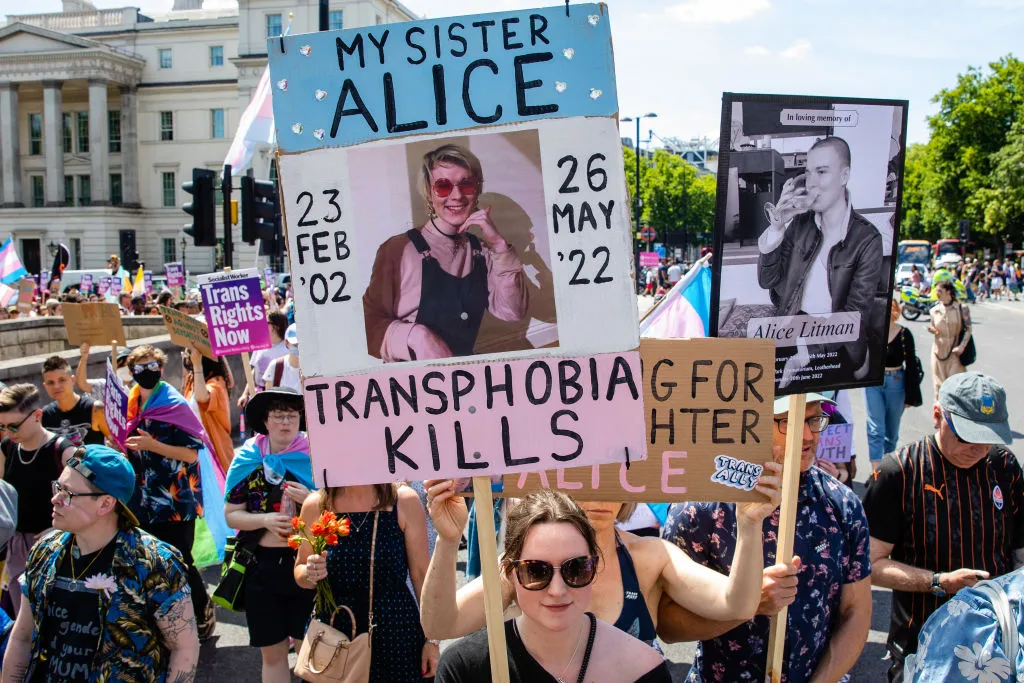
An upcoming inquest into the tragic death of 20-year-old trans woman Alice Litman is set to shed light on the profound impact of lengthy waiting lists for gender-affirming care in the United Kingdom. Alice Litman passed away in May of the previous year, and her family believes that the extended wait she endured played a role in her untimely death.
Alice had been referred to an NHS gender clinic in August 2019, embarking on a journey marked by more than 1,000 days of waiting for an initial assessment. Her family describes her as a “sweet and gentle person,” whose life was marred by the prolonged struggle to access essential gender-affirming healthcare.
The upcoming inquest, scheduled to commence on September 18, will closely examine the delays Alice encountered in her quest for gender-affirming care, with a particular focus on the services provided by London’s Tavistock Gender Identity Clinic, as per her family’s statement.
Tragically, her family believes that Alice “died partly because of the inaccessibility of gender-affirming healthcare in the UK.” At the time of her passing, Alice had spent an excruciating 1,023 days on the waiting list. She had described these years of waiting and the inadequacy of her care as leaving her feeling hopeless and helpless, without any end in sight.
In their quest for justice and meaningful change, Alice’s family hopes that the coroner overseeing the inquest will recognize the shortcomings in trans healthcare as a contributing factor to her death. They also aim to advocate for reforms that can enhance the lives of other transgender individuals in the UK.

In a poignant opinion piece published on PinkNews, Alice’s sister Kate expressed the family’s deep sense of loss and their yearning for accountability from the institutions that failed her sister. While acknowledging that there might never be a straightforward answer as to why Alice chose to end her life, Kate emphasized that Alice faced formidable external barriers to her happiness and well-being.
Kate also decried the broader system of violence directed towards transgender people, highlighting the increasing hostility and hatred that have become routine in the British press in recent years.
In addition to examining gender-affirming care access, the inquest could delve into the actions of NHS adult mental health services, which reportedly discharged Alice from treatment for depression and anxiety once she turned 18, transferring her out of Child and Adolescent Mental Health Services.
The Good Law Project, a legal advocacy organization, is providing support for Alice’s case. Ellie Mae O’Hagan, the head of engagement at the Good Law Project, emphasized the urgency of addressing this issue, stating that no family should have to endure the loss of a loved one due to extended waiting times for healthcare. She called on the coroner to acknowledge that Alice’s prolonged wait for care from the gender-identity clinic was a contributing factor in her tragic death, expressing the hope that no other families would have to endure a similar ordeal.
In February, when the inquest was initially announced, the Tavistock and Portman NHS Foundation Trust, where the clinic is based, expressed deep sadness at Alice’s passing but refrained from commenting further until the inquest concludes.
The story of Alice Litman’s struggle and untimely death serves as a poignant reminder of the urgent need to improve access to gender-affirming care for transgender individuals and to address the systemic challenges they face in their pursuit of happiness and well-being.
Author























